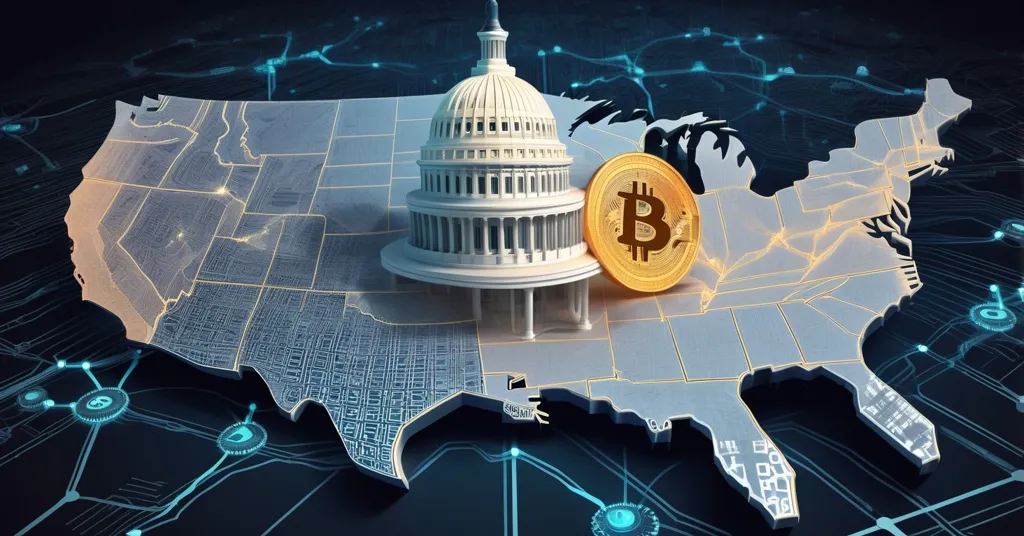Senate Approves 10-Year Ban on State AI Laws: Centralization Clash Echoes Bitcoin Battles

Senate Parliamentarian Approves 10-Year Ban on State AI Laws: A Centralization Battle Bitcoiners Will Recognize
A bombshell ruling from Senate Parliamentarian Elizabeth MacDonough has greenlit a Republican proposal to slap a 10-year moratorium on state and local artificial intelligence (AI) regulations, tucking it into a massive tax and spending bill. Backed by Senate Commerce Chair Ted Cruz, this move aims to lock in a single national AI policy, but it’s igniting a firestorm over state autonomy versus federal control—a fight that should feel damn familiar to anyone in the Bitcoin and crypto space.
- Core Decision: 10-year ban on state and local AI rules approved for a major legislative package.
- State Penalty: Enforce AI laws, lose billions in federal broadband funds.
- Pushback: Bipartisan opposition risks derailing the bill before the July 4 Senate vote.
The Federal Push to Control AI: One Rule to Rule Them All
Late Saturday, MacDonough gave the nod to a plan that seeks to streamline AI governance under a unified national framework. The logic, as pitched by proponents, is simple: without a single set of rules, the U.S. could spiral into a regulatory mess—50 states, 50 different takes on everything from facial recognition to AI-driven biases. Senate Commerce Chair Ted Cruz is leading the charge, arguing for consistency over chaos, a stance highlighted in recent statements on national AI policy.
Blocking state and local action on AI ‘is good policy’ because it creates a uniform national approach.
Rep. Jay Obernolte of California doubled down, painting a grim picture of the alternative.
Without the freeze, the country could face ‘a labyrinth of regulation’ with ’50 different states going 50 different directions on the topic of AI regulation.’
Here’s the stick they’re wielding: states that defy this decade-long freeze by passing their own AI laws will get cut off from federal broadband expansion funding. We’re talking billions of dollars—cash that’s often a lifeline for building internet access in rural or underserved areas, critical for schools, businesses, and basic connectivity. This penalty isn’t just a nudge; it’s a full-on arm-twist, with significant impacts on state funding discussed in online forums. The measure is part of a broader tax and spending package under President Donald Trump’s agenda, pushed through via budget reconciliation—a Senate shortcut that lets Republicans pass the bill with a simple majority, dodging the usual 60-vote hurdle and Democratic filibuster tactics.
States Fight Back: Why Local Rules Matter
Not everyone’s buying the federal overreach, and the opposition is loud from both sides of the aisle. Conservative Republicans like Senators Josh Hawley of Missouri and Marsha Blackburn of Tennessee are pushing back hard, insisting that states must keep the right to shield their citizens from AI’s darker edges—think privacy invasions, biased algorithms that unfairly target groups due to flawed data, or even AI-generated harms like deepfake scams. Blackburn laid it out plain and simple.
We do not need a moratorium that would prohibit our states from stepping up and protecting citizens in their state.
Hawley is reportedly teaming up with Democrats to craft an amendment that strips this moratorium out entirely. Over in the House, Rep. Marjorie Taylor Greene of Georgia and the hardline House Freedom Caucus are threatening to tank H.R. 1—the legislative cornerstone—if this AI freeze stays in. This isn’t idle chatter; their dissent could shatter GOP unity and sink the bill before the Senate’s July 4 deadline, a conflict rooted in broader debates over federal versus state control of AI.
States have been on the front lines of tackling AI risks, with nearly 20 safety laws in the works nationwide. These cover a range of issues, from requiring transparency in how AI systems make decisions to banning AI-generated content like child sexual abuse material—a horrifying trend that often targets young girls and spreads like wildfire online. Take Tennessee’s 2024 law protecting voice and likeness rights, which spurred the federal NO FAKES Act. Or consider California’s push for strict AI data privacy rules. These local efforts show states can move fast to address specific harms, often outpacing federal gridlock. A 10-year freeze? That’s not just a pause—it’s a gag order on innovation and protection at the ground level, an issue explored in discussions on AI regulatory frameworks.
Big Tech’s Quiet Victory: A Decade-Long Hall Pass
Let’s cut through the noise—Big Tech is the real winner here. This moratorium slams the brakes on those 20 state-level AI safety laws, saving tech giants from immediate compliance costs and regulatory scrutiny while they scale their systems unchecked. Sound like a familiar playbook? It should. Congress has a long history of playing nice with tech titans, from Section 230 protections that shield platforms from liability to dragging its feet on accountability after the 2017 “techlash.” Writer and consultant David Newhoff called this 10-year freeze “madness,” arguing it cripples states from tackling urgent AI abuses, a perspective echoed in critiques of the freeze’s impact on tech and broadband. Senators like Lindsey Graham have gone further, accusing tech leaders of having “blood on their hands” over failures to curb harm, while Sheldon Whitehouse slammed platforms for lousy self-policing. Big Tech gets a free ride, while states are left holding the bag—shocker.
Decentralization Lessons from Bitcoin: A Familiar Fight
For those of us in the Bitcoin and crypto world, this AI showdown reeks of the same centralization versus autonomy clash we’ve been fighting for years. Just as Bitcoin challenges the iron grip of centralized finance, state-level AI laws are a push against federal monopolies on tech policy. A top-down national AI framework might streamline things for corporations, but it risks stomping out local experimentation—much like heavy-handed crypto regulations threaten to choke DeFi projects or privacy-focused coins. Could blockchain offer a way out? Imagine decentralized identity systems, like Ethereum-based DIDs (Digital Identifiers), letting users control what data AI can touch, cutting Big Tech out of the loop. Or smart contracts enforcing consent for voice and likeness use, echoing state laws like Tennessee’s. A federal freeze could strangle such grassroots ideas before they even take root, a concern tied to Bitcoin’s lessons for AI policy.
Let’s play devil’s advocate for a second. A national AI policy isn’t pure evil—it could prevent regulatory arbitrage, where companies flock to states with lax rules, creating uneven risks. But here’s the rub: centralized control rarely stops at “just enough.” Look at legacy finance’s endless overreach—think CBDCs (central bank digital currencies) with built-in surveillance. If this AI moratorium passes, what’s stopping similar top-down mandates in crypto? States, often more nimble than Congress, could be allies for decentralized tech if given the chance to experiment. Crush that, and you’re paving the way for more D.C. dominance, a topic dissected in academic debates on centralization versus decentralization. Sound like a HODL you’d touch? Didn’t think so.
What’s Next: July Vote and Beyond
With the Senate racing toward a vote by early July, the stakes are sky-high. This isn’t just about AI—it’s about who gets to steer frontier tech in an era of breakneck change. Will we hand the wheel to federal bureaucrats and corporate giants with a 10-year lockdown, or let states act as labs of democracy, tackling local risks in real time? The outcome could ripple far beyond AI, setting the tone for how blockchain, DeFi, and privacy tech are governed for decades. If Congress botches this, don’t hold your breath for sane crypto policy anytime soon. With just weeks until the showdown, the tech world—and crypto’s future—hangs in the balance, following the Senate’s approval of the AI rules freeze and the parliamentarian’s controversial ruling. Stay sharp.
Key Takeaways: Unpacking the AI Regulation Freeze
- What’s Driving the 10-Year Ban on State AI Laws?
It’s a Senate effort to lock in one national AI policy, aiming to avoid a chaotic mix of state rules that could stall tech growth and confuse compliance. - Why Are States Getting Hit with Penalties?
States that pass their own AI laws during the freeze lose federal broadband funds—billions needed for internet access in underserved regions. - Who’s Against This Federal AI Takeover and Why?
Republican and Democratic lawmakers alike say states need the freedom to protect folks from AI dangers like privacy breaches and biased systems, tailored to local needs. - How Does Big Tech Come Out on Top?
Tech giants sidestep nearly 20 state AI safety laws, dodging costs and oversight while they ramp up unchecked—classic corporate handout. - What’s the Connection to Blockchain and Decentralization?
This centralization versus autonomy fight echoes crypto’s own battles; federal AI control could set ugly precedents for stifling blockchain and DeFi innovation.



